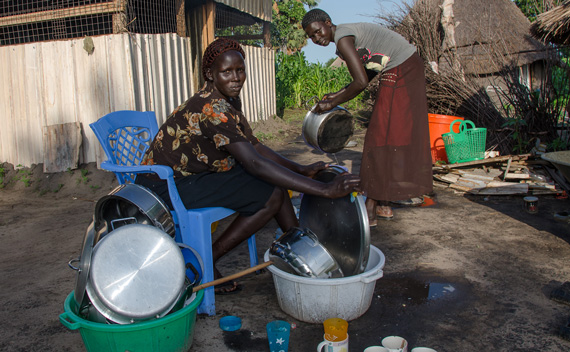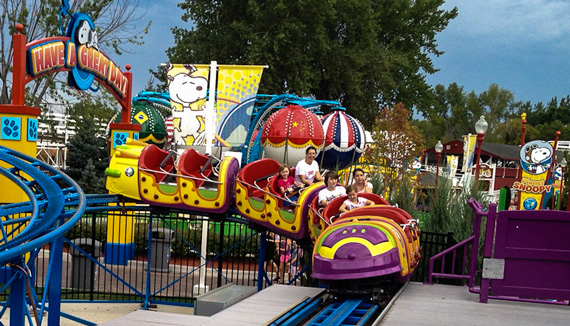< Return to Blog List
Logistics and Challenges
This morning as Hailey (six) and Donaven (12)—my son, Aaron’s children—sleep in our Minneapolis hotel room, I’m reflecting on the challenges and logistics involved to navigate through daily life, and the increased complexity presented by travel and extended family.
People who don’t travel to remote places in Africa are often intrigued or awed by what it takes to get there and certain they have never encountered such a challenge. If you’re in that category, rest assured that shepherding four grandchildren, even with the help of a wonderful daughter-in-law, to Valley Fair—a huge amusement park in Minneapolis—offers similar challenges, though the experience at the fair is compressed into an eight-hour period of time instead of spread over weeks.
To travel to South Sudan, I schedule an international flight from Fargo to Nairobi. My decision is made somewhat easier by the support Delta offers ASAH right from the start. The fare is generally higher than bargain prices on offered on travel sites, but the Delta flight is 24 hours versus 36 or more with a comfortable five-hour layover in the familiar Amsterdam Schiphol Airport. Most important, Delta allows me up to 10–50-pound bags of supplies for ASAH at no charge.

Once in Nairobi, I have a couple of days to purchase supplies, visit our Kenya kids, rest, and regroup for the AIM Air flight to the village in South Sudan. That’s always tricky because I schedule my US flight long before I know how I will get to South Sudan and back. We charter the AIM flight, but they must determine the availability of a plane and a pilot. Pilots are limited to hours per day and per week, and there are many mission groups relying on AIM, and they help us find the most cost-effective way for us to travel.
Going to Valley Fair required daughter-in-law, Sheila, who lives in the cities, to determine the best way to get the best prices on six tickets. She recommending waiting until the Seattle kids arrived to make sure all were healthy enough for the adventure. We agreed to meet at the entrance, but Sheila and I had a different idea of “entrance” so it took a little bit of “where could they be?” on both our sides before we found each other.
At the ASAH School, I coordinate my own needs for sleep, food, showering, time for writing, photographing, videotaping, and internet use with our own staff, our ASAH girls, the availability of firewood (which can delay meals), and with the Lost Boys Clinic, where we must walk for internet, which is available only limited hours of the day.

At Valley Fair, Sheila and I juggled Hailey, Donaven and her daughters, Isabelle (11) and Olivia (7) through thrill rides—which Hailey was too small for and Donaven doesn’t enjoy—often splitting up and then criss-crossing the large Valley Fair site to meet up for shared experiences—the Born to be Wild IMAX show, for example, which featured the Nairobi Elephant Orphanage, which I have visited twice. I think I recognized a couple of the elephant keepers who bond closely with the babies; even sleeping in their barns with them as they need “mothering” even during the night.
The heat of Valley Fair mimicked my recent experience in the village. Clouds and sprinkling rain kept it cool in the morning, but after noon, a clear sky with no breeze made the 89-degree weather sweltering. And, naturally, we walked and we walked and stood in this heat.
I don’t know if the fact that I was wearing the same flip-flops I wore on my last trip to Duk Payuel made the two disparate experiences seem so similar, but I was hot and sweaty in both situations. At Valley Fair, air-conditioned bathrooms, indoor shows, and some eating places provide respite. Even just walking through the door of one of these helps a bit. In Sudan we have beautiful shade trees, but walking between the ASAH School and other village locations means long walks through open areas without shade. And there is no air-conditioning; not even a fan. A hard rain in Duk makes for a cool day and evening, but evening the cloudy water on the flooded paths is generally warm, not refreshing like a cool stream or like the blast of water on a water ride at the fair.
All in all, these days, except for the company of the grandchildren, I’d choose South Sudan over the fair. Maybe one day these grandchildren will be able to experience the thrill of helping others as well.
About the Author
Deb Dawson is a writer, photographer, filmmaker, businesswoman, teacher, humanitarian, and philanthropist. She holds a B.S. Ed. in Education and English, and an MFA in Creative Writing. Her role as mother to biological, step, and internationally adopted children led her to write When Love is Not Enough, a memoir about the way mothers and daughters forge relationships in the face of tremendous obstacles.
Leave a Comment